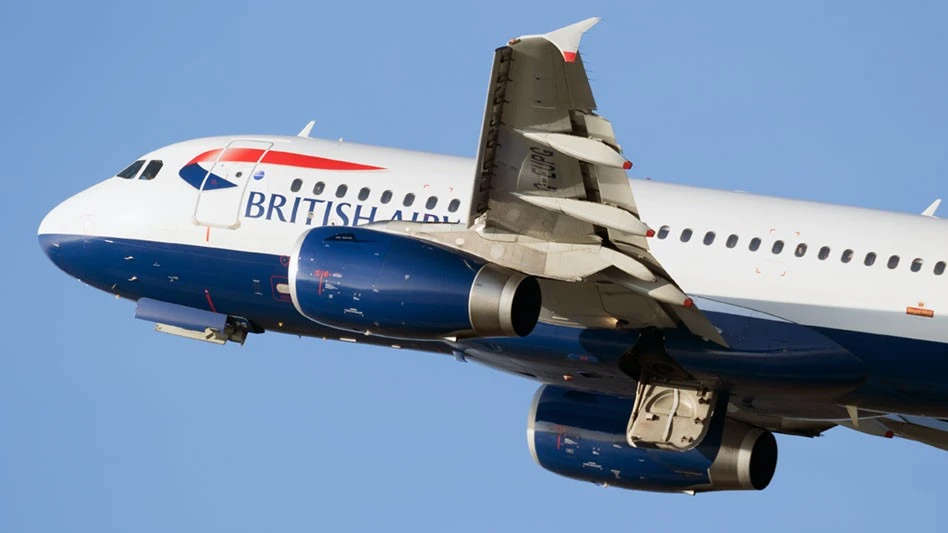
VanderWolf Images | stock.adobe.com
British Airways, Nova Pangaea Technologies, both based in the United Kingdom, and Deerfield, Illinois-based LanzaJet have signed an agreement that will accelerate their Project Speedbird initiative to develop cost-effective sustainable aviation fuel (SAF) for commercial use in the United Kingdom.
The SAF will be developed using a combination of technologies based on Nova Pangaea’s Refnova process of converting agricultural and wood waste into bioethanol and biochar. LanzaJet’s patented alcohol-to-jet technology, the first of its kind, then converts the bioethanol to produce SAF and renewable diesel.
“This project will deliver the first end-to-end, sustainable value chain from agricultural and wood waste to SAF in the U.K.,” Nova Pangaea Technologies CEO Sarah Ellerby says. “It will undoubtedly play a very important role in the growing momentum towards decarbonizing our aviation sector.”
Project Speedbird was launched by the three companies in 2021 and granted nearly £500,000 ($575,750) by the U.K. Department for Transport’s (DfT) Green Fuels, Green Skies competition for an initial feasibility study, which is complete. Project Speedbird would create the U.K.’s first SAF facility using agricultural and wood waste taken from sustainable sources.
As part of the agreement, British Airways’ parent company, International Airlines Group (IAG), London, is investing in the project to support the next phase of work that will help decarbonize the aviation industry.
Project Speedbird has applied for the DfT’s Advanced Fuels Fund grant for additional funding, which will be key to the project’s continued development while the DfT seeks to roll out its Jet Zero strategy that includes implementing a 2025 SAF mandate, which will require at airlines in the U.K. to use at least 10 percent SAF by 2030.
“The U.K. is a critical market in the decarbonization of the aviation industry, and this partnership brings together the full value chain from agricultural and wood waste to finished sustainable aviation fuel and use by British Airways,” LanzaJet CEO Jimmy Samartzis says. “This is about impact—on the economy, on energy security and on climate. We appreciate the DfT’s support as we scale up, continue to improve capital and process efficiency and enable production and use of SAF at a time when immediate action is needed.”
The Project Speedbird facility—which the partners plan to build in northeast England—would transform agricultural and wood waste taken from sustainable sources into 102 million liters (nearly 27 million gallons) of SAF per year. Construction could begin as early as 2023, and the facility is expected to be producing SAF by 2026.
British Airways intends to use all the SAF produced through Project Speedbird to help power some of its flights. The SAF produced would reduce carbon dioxide (CO2) emissions on a net lifecycle basis by 230,000 tonnes a year. This is the equivalent of approximately 26,000 domestic British Airways flights. Overall, Project Speedbird has the potential to reduce CO2 emissions by up to 770,000 tonnes a year as the combined processes also produce renewable diesel and biochar.
“Project Speedbird is another great step toward our mission to reach net zero carbon emissions by 2050 or sooner and achieve our target of using SAF for 10% of our fuel by 2030,” British Airways Director of Sustainability Carrie Harris says. “SAF is in high demand but in short supply across the globe, and so it is essential that we scale up its production as quickly as possible. With further investment and continued government support, Speedbird will be a key and pioneering project in the production of SAF here in the U.K.”
Project Speedbird would generate hundreds of skilled employment jobs with the generation and supply chain opportunities in northeast England and help spread the benefits of investment in green technologies across the UK. It also would bolster the UK’s energy security.
Related stories: Indaba invests in waste-to-aviation fuel capacity | NC State awarded $2.25M grant to develop sustainable energy products from waste streams
Latest from Recycling Today
- BMW Group, Encory launch 'direct recycling’ of batteries
- Loom Carbon, RTI International partner to scale textile recycling technology
- Goodwill Industries of West Michigan, American Glass Mosaics partner to divert glass from landfill
- CARI forms federal advocacy partnership
- Monthly packaging papers shipments down in November
- STEEL Act aims to enhance trade enforcement to prevent dumping of steel in the US
- San Francisco schools introduce compostable lunch trays
- Aduro graduates from Shell GameChanger program





